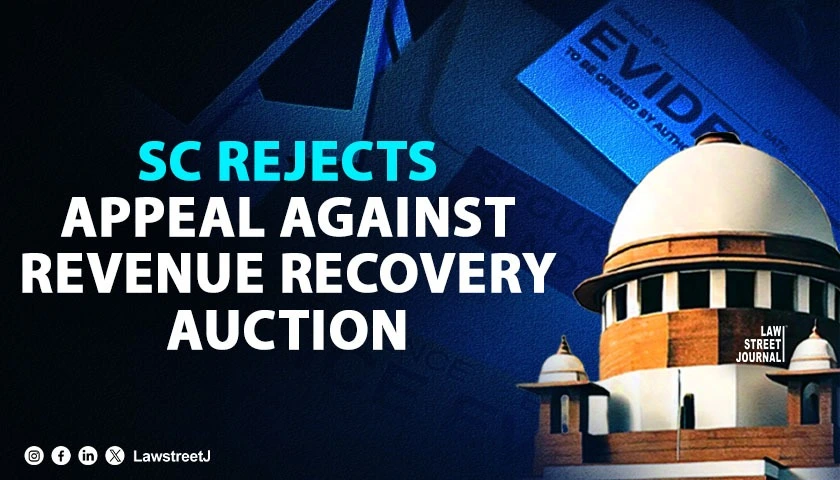New Delhi: The Supreme Court has dismissed an appeal challenging the Madras High Court’s decision in a revenue recovery case, holding that auction proceedings conducted under the Tamil Nadu Revenue Recovery Act were legally valid and that the appellant failed to invoke statutory remedies within the prescribed timelines.
A Bench comprising Justice Datish Chandra Sharma and Justice Vipul M. Pancholi delivered its judgment on November 14, 2025, upholding the findings of both the Division Bench and the Review Bench of the Madras High Court, thereby bringing finality to a dispute that has persisted since the late 1990s.
The case involved the late Ramaswamy Udayar, who had successfully bid for arrack shops in Thiruvayaru and Valkundapuram villages in 1972–73 but later defaulted on payments to the District Collector, Perambalur. An ex-parte decree was obtained against him in 1987 for ₹95,170.20. Following Ramaswamy’s death in 1988, his legal heirs faced recovery proceedings, and while partition proceedings were pending, authorities issued auction notices in 2005 to recover the alleged dues.
The appellant, Karunanidhi (Ramaswamy’s son), challenged these notices before the High Court, contending that the auction was illegal and conducted during the pendency of writ proceedings. Despite interim orders and partial deposits made as directed by the High Court, the authorities conducted the auction in July 2005 and confirmed the sale on 23.07.2005. The sale certificate was issued, the property was registered in the respondent-auction purchaser’s name, and subsequent transfers were made to bona fide purchasers.
The Writ Petition and Writ Appeal filed by the appellant challenging the auction sale of Patta Nos. 78B and 78D in Mottapalayam South Village were dismissed by the High Court. The Review Application was also rejected, leading to the present appeal before the Supreme Court.
The Court examined whether the appellant—having failed to invoke statutory remedies under Sections 37-A and 38 of the Tamil Nadu Revenue Recovery Act within the prescribed 30-day limitation period—could subsequently challenge the auction proceedings through writ jurisdiction.
The Supreme Court observed:
“Sections 37-A and 38 of the Revenue Recovery Act provide a complete mechanism for setting aside a sale of immovable property conducted under the Act… This statutory framework is mandatory and self-contained, leaving little scope for collateral challenges once the period expires.”
The Court noted that the auction took place on 29.07.2005 and the confirmation was made on 23.07.2005. Critically, the appellant did not file any application under Sections 37-A or 38 within the 30-day limitation period to set aside the sale, nor did he challenge the confirmation date under the statutory scheme.
The Court emphasized that although the appellant deposited approximately ₹3,41,000 pursuant to interim orders, this neither satisfied the alleged dues nor retrospectively validated non-compliance with statutory requirements. The Court held that payments made pursuant to interim orders do not constitute substantive payments for the purposes of Sections 37-A or 38.
Clarifying further, the judgment stated:
“The appellant relied upon deposits totaling approximately ₹3,41,000/- made pursuant to interim orders of the High Court to contend that the alleged dues stood substantially satisfied. However, these payments were made pursuant to interim directions and not as part of any statutory application under Section 37-A.”
The Court held that Section 37-A mandates both a deposit and a formal application to the Collector within 30 days of sale—neither of which was done.
Referring to precedents—including Rajasthan Housing Board v. Krishna Kumari (2005) and State of M.P. v. M.V. Vyanaya & Co. (1987)—the Court cautioned that interim orders cannot be used to frustrate statutory revenue recovery processes. It reiterated that public revenue should not suffer due to interim protections.
The Court also rejected the appellant’s argument that the 1987 ex-parte decree was obtained without notice or that recovery should have proceeded under the Civil Procedure Code rather than the Revenue Recovery Act. Once arrears were certified as recoverable under the Act, authorities were empowered to initiate revenue recovery steps. The appellant did not take timely action to set aside the decree or challenge its enforceability.
Addressing the rights of subsequent bona fide purchasers, the Court cited Valji Khimji and Co. v. Official Liquidator of Hindustan Nitro Product (Gujarat) Ltd. (2000) to affirm that once a sale is confirmed, vested rights accrue in favour of the purchaser and cannot be disturbed except in cases of fraud or substantial irregularity.
The Court reiterated that review proceedings cannot be treated as an appeal in disguise. Citing Lily Thomas v. Union of India (2000) and Parison Devi v. Sumitri Devi (1997), the Bench held that review lies only when there is an “error apparent on the face of the record,” which the appellant failed to demonstrate.
The Court found no material to show that the High Court exceeded its jurisdiction or violated natural justice. The appellant received multiple opportunities across writ, appeal, and review proceedings. The concurrent findings disclosed no perversity warranting interference.
Dismissing the appeal, the Supreme Court concluded:
“The appellant failed to invoke the statutory remedies under Sections 37-A or 38 of the Revenue Recovery Act within the prescribed time. The auction held on 29.07.2005 and confirmed on 23.07.2005 was conducted in accordance with law.”
Accordingly, the High Court’s judgment dated 07.08.2009 and the order dated 06.01.2011 were upheld, and the appeal was dismissed.
For Appellant(s):
Mr. T. Raja, Sr. Adv.; Ms. Mary Mitzy, Adv.; Mr. Oleander D. Singh, Adv.;
Mr. Pratham Sadh, Adv.; Mr. Rohit, Adv.; Mr. Ashutosh Jha, AOR
For Respondent(s):
Mr. Sabarish Subramanian, AOR; Ms. Mukta Gupta, Sr. Adv.;
Ms. Rashmi Nandakumar, AOR; Ms. Yashmita Pandey, Adv.
Case Title: Kolanjhammal (D) Thr. L.Rs. v. The Revenue Divisional Officer, Perambalur District & Ors.
Court: Supreme Court of India
Bench: Justice Datish Chandra Sharma and Justice Vipul M. Pancholi
Civil Appeal No.: 2322 of 2013
Date of Judgment: November 14, 2025











